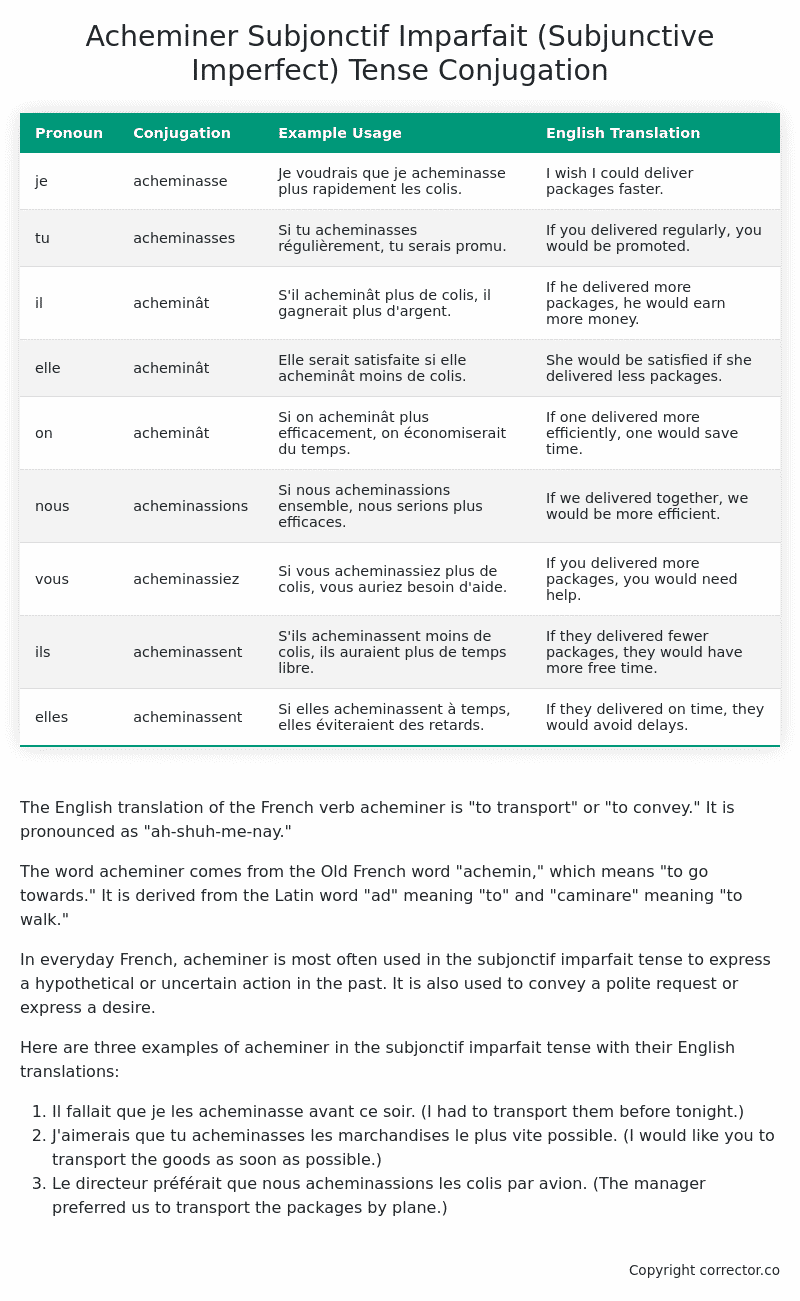Subjonctif Imparfait (Subjunctive Imperfect) Tense Conjugation of the French Verb acheminer
Introduction to the verb acheminer
The English translation of the French verb acheminer is “to transport” or “to convey.” It is pronounced as “ah-shuh-me-nay.”
The word acheminer comes from the Old French word “achemin,” which means “to go towards.” It is derived from the Latin word “ad” meaning “to” and “caminare” meaning “to walk.”
In everyday French, acheminer is most often used in the subjonctif imparfait tense to express a hypothetical or uncertain action in the past. It is also used to convey a polite request or express a desire.
Here are three examples of acheminer in the subjonctif imparfait tense with their English translations:
- Il fallait que je les acheminasse avant ce soir. (I had to transport them before tonight.)
- J’aimerais que tu acheminasses les marchandises le plus vite possible. (I would like you to transport the goods as soon as possible.)
- Le directeur préférait que nous acheminassions les colis par avion. (The manager preferred us to transport the packages by plane.)
Table of the Subjonctif Imparfait (Subjunctive Imperfect) Tense Conjugation of acheminer
| Pronoun | Conjugation | Example Usage | English Translation |
|---|---|---|---|
| je | acheminasse | Je voudrais que je acheminasse plus rapidement les colis. | I wish I could deliver packages faster. |
| tu | acheminasses | Si tu acheminasses régulièrement, tu serais promu. | If you delivered regularly, you would be promoted. |
| il | acheminât | S’il acheminât plus de colis, il gagnerait plus d’argent. | If he delivered more packages, he would earn more money. |
| elle | acheminât | Elle serait satisfaite si elle acheminât moins de colis. | She would be satisfied if she delivered less packages. |
| on | acheminât | Si on acheminât plus efficacement, on économiserait du temps. | If one delivered more efficiently, one would save time. |
| nous | acheminassions | Si nous acheminassions ensemble, nous serions plus efficaces. | If we delivered together, we would be more efficient. |
| vous | acheminassiez | Si vous acheminassiez plus de colis, vous auriez besoin d’aide. | If you delivered more packages, you would need help. |
| ils | acheminassent | S’ils acheminassent moins de colis, ils auraient plus de temps libre. | If they delivered fewer packages, they would have more free time. |
| elles | acheminassent | Si elles acheminassent à temps, elles éviteraient des retards. | If they delivered on time, they would avoid delays. |
Other Conjugations for Acheminer.
Le Present (Present Tense) Conjugation of the French Verb acheminer
Imparfait (Imperfect) Tense Conjugation of the French Verb acheminer
Passé Simple (Simple Past) Tense Conjugation of the French Verb acheminer
Passé Composé (Present Perfect) Tense Conjugation of the French Verb acheminer
Futur Simple (Simple Future) Tense Conjugation of the French Verb acheminer
Futur Proche (Near Future) Tense Conjugation of the French Verb acheminer
Plus-que-parfait (Pluperfect) Tense Conjugation of the French Verb acheminer
Passé Antérieur (Past Anterior) Tense Conjugation of the French Verb acheminer
Futur Antérieur (Future Anterior) Tense Conjugation of the French Verb acheminer
Subjonctif Présent (Subjunctive Present) Tense Conjugation of the French Verb acheminer
Subjonctif Passé (Subjunctive Past) Tense Conjugation of the French Verb acheminer
Subjonctif Imparfait (Subjunctive Imperfect) Tense Conjugation of the French Verb acheminer (this article)
Subjonctif Plus-que-parfait (Subjunctive Pluperfect) Tense Conjugation of the French Verb acheminer
Conditionnel Présent (Conditional Present) Tense Conjugation of the French Verb acheminer
Conditionnel Passé (Conditional Past) Tense Conjugation of the French Verb acheminer
L’impératif Présent (Imperative Present) Tense Conjugation of the French Verb acheminer
L’infinitif Présent (Infinitive Present) Tense Conjugation of the French Verb acheminer
Struggling with French verbs or the language in general? Why not use our free French Grammar Checker – no registration required!
Get a FREE Download Study Sheet of this Conjugation 🔥
Simply right click the image below, click “save image” and get your free reference for the acheminer Subjonctif Imparfait tense conjugation!

Acheminer – About the French Subjonctif Imparfait (Subjunctive Imperfect) Tense
Formation
Common Everyday Usage Patterns
Interactions with Other Tenses
Subjonctif Présent
Indicatif Passé Composé
Conditional
Conditional Perfect
Summary
I hope you enjoyed this article on the verb acheminer. Still in a learning mood? Check out another TOTALLY random French verb conjugation!


